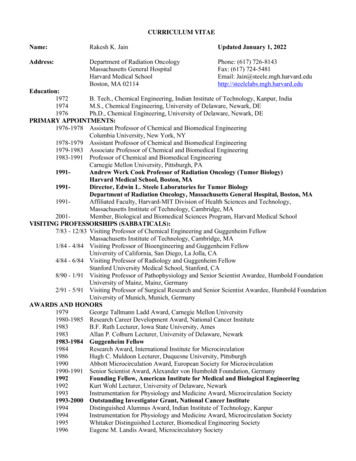
Transcription
CURRICULUM VITAEName:Rakesh K. JainUpdated January 1, 2022Address:Department of Radiation OncologyMassachusetts General HospitalHarvard Medical SchoolBoston, MA 02114Phone: (617) 726-8143Fax: (617) 724-5481Email: arvard.eduEducation:1972B. Tech., Chemical Engineering, Indian Institute of Technology, Kanpur, India1974M.S., Chemical Engineering, University of Delaware, Newark, DE1976Ph.D., Chemical Engineering, University of Delaware, Newark, DEPRIMARY APPOINTMENTS:1976-1978 Assistant Professor of Chemical and Biomedical EngineeringColumbia University, New York, NY1978-1979 Assistant Professor of Chemical and Biomedical Engineering1979-1983 Associate Professor of Chemical and Biomedical Engineering1983-1991 Professor of Chemical and Biomedical EngineeringCarnegie Mellon University, Pittsburgh, PA1991Andrew Werk Cook Professor of Radiation Oncology (Tumor Biology)Harvard Medical School, Boston, MA1991Director, Edwin L. Steele Laboratories for Tumor BiologyDepartment of Radiation Oncology, Massachusetts General Hospital, Boston, MA1991Affiliated Faculty, Harvard-MIT Division of Health Sciences and Technology,Massachusetts Institute of Technology, Cambridge, MA2001Member, Biological and Biomedical Sciences Program, Harvard Medical SchoolVISITING PROFESSORSHIPS (SABBATICALS):7/83 - 12/83 Visiting Professor of Chemical Engineering and Guggenheim FellowMassachusetts Institute of Technology, Cambridge, MA1/84 - 4/84 Visiting Professor of Bioengineering and Guggenheim FellowUniversity of California, San Diego, La Jolla, CA4/84 - 6/84 Visiting Professor of Radiology and Guggenheim FellowStanford University Medical School, Stanford, CA8/90 - 1/91 Visiting Professor of Pathophysiology and Senior Scientist Awardee, Humbold FoundationUniversity of Mainz, Mainz, Germany2/91 - 5/91 Visiting Professor of Surgical Research and Senior Scientist Awardee, Humbold FoundationUniversity of Munich, Munich, GermanyAWARDS AND HONORS1979George Tallmann Ladd Award, Carnegie Mellon University1980-1985 Research Career Development Award, National Cancer Institute1983B.F. Ruth Lecturer, Iowa State University, Ames1983Allan P. Colburn Lecturer, University of Delaware, Newark1983-1984 Guggenheim Fellow1984Research Award, International Institute for Microcirculation1986Hugh C. Muldoon Lecturer, Duquesne University, Pittsburgh1990Abbott Microcirculation Award, European Society for Microcirculation1990-1991 Senior Scientist Award, Alexander von Humboldt Foundation, Germany1992Founding Fellow, American Institute for Medical and Biological Engineering1992Kurt Wohl Lecturer, University of Delaware, Newark1993Instrumentation for Physiology and Medicine Award, Microcirculation Society1993-2000 Outstanding Investigator Grant, National Cancer Institute1994Distinguished Alumnus Award, Indian Institute of Technology, Kanpur1994Instrumentation for Physiology and Medicine Award, Microcirculation Society1995Whitaker Distinguished Lecturer, Biomedical Engineering Society1996Eugene M. Landis Award, Microcirculatory Society
20142014201420142015201520152015Board of Directors, Biomedical Engineering SocietyWilliam D. Kaplan Lecturer in Nuclear Medicine, Harvard Medical SchoolBerkeley Lecturer, University of California, BerkeleyPharmaceutical and Bioengineering Award, American Institute of Chemical EngineersHonorary Fellow, Indian Institute of Chemical EngineersGerritsen Award, Microcirculatory SocietyAlumni Wall of Fame, University of DelawareElected to the National Academy of Medicine (formerly Institute of Medicine) (NAM)Elected to the National Academy of Engineering (NAE)Robert Bras Lecturer, Princess Margaret Hospital and National Cancer Institute of CanadaJohn S. Laughlin Lecturer, Memorial Sloan-Kettering Cancer Center, New YorkAcademic Scientist of the Year, 2005 Pharmaceutical Achievement AwardsDistinguished Service Award, Nature Biotechnology-Miami Symposium on AngiogenesisOutstanding Achievement Award, Society of American Asian Scientists in Cancer ResearcRobert L. Krigel Lecture, Fox Chase Cancer Center, PhiladelphiaAlpha Chi Sigma Research Award, American Institute of Chemical EngineersBenjamin Zweifach Distinguished Lecture, The City College, New YorkResearch Team Award, Clinical Research Day, MGHSam Gerson Leadership Chair of Research, Brain Tumor SocietyRichard D. Frisbee III Oncology Lecture, Yale UniversitySir Godfrey Hounsfield Medal and Lecture, Imperial College, LondonPeter C. Reilly Lectures, University of Notre Dame, IndianaCharles G. Moertel Lecture, Mayo Clinic, Rochester, MinnesotaAshland Distinguished Lecture, University of Kentucky, Lexington, KentuckyWilliam E. Schiesser Lecture, Lehigh University, Bethlehem, PennsylvaniaElected to the American Academy of Arts and SciencesBenjamin Zweifach Lecture, University of California, San Diego, CaliforniaEli Ruckenstein Lecture, State University of New York, BuffaloElected to the National Academy of Sciences (NAS)Breast Cancer Research Innovator Award, Department of DefenseJoseph Martin Prize for Excellence in Clinical Research, MGHPirkey Lecture, University of Texas at AustinKelley Lectures, Purdue UniversityWilliam B. Lowrie Lecture, Ohio State UniversityWagner Lecture, University of MichiganDistinguished Research Lecturer, Carnegie Mellon UniversityRoland T. Lakey Award, Wayne State UniversityAmerican Cancer Society Basic Science Lecture, Society of Surgical OncologyRous-Whipple Award, American Society of Investigative PathologyIrving O. Shoichet Lecture, University of Toronto, CanadaOne of the 18 Indians Doing Cutting-Edge Research, Forbes (India)Herman Schwan Lecture, University of PennsylvaniaASCO Science of Oncology Award and Lecture, American Society of Clinical OncologyGerritsen Award, Microcirculation Society (for the most cited review in the past 5 years)Fellow, National Foundation for Cancer ResearchEarl Bakken Distinguished Lecture, Amer. Institute for Medical and Biological EngineeringGerritsen Award, Microcirculation Society (for the most cited review in the past 5 years)AACR-Princess Takamatsu Lecture/Award, American Association for Cancer ResearchOne of 50 Oncology Luminaries, American Society of Clinical Oncology (ASCO)One of the top 1% cited researchers in Clinical Medicine, Thomson ReutersMost cited paper (2013), Annals of Biomedical EngineeringFellow, American Association for the Advancement of Science (AAAS)Foreign Fellow, Indian National Science Academy (INSA)Honorary Doctorate, Katholieke Universiteit Leuven, BelgiumMethusalem Lecture, Katholieke Universiteit Leuven, BelgiumHonorary Doctorate, Indian Institute of Technology (IIT), Kanpur, India
2015Arabindo Nath Bose Distinguished Lecture, IIT-Kanpur, India2015Alan S. Michaels Distinguished Lecture in Medical and Biological Engineering, MIT2015ASGBI Lecture, Association of Surgeons of Great Britain & Ireland, Manchester, UK2015Honorary Doctorate, Duke University2015-22Outstanding Investigator Award, National Cancer Institute2015Fredrickson Lecture, University of Minnesota2015One of the top 1% cited researchers in Clinical Medicine, Thomson Reuters2016Princess Takamatsu Cancer Research Fund International Lecturer, Japan2016One of the Most Influential/Cited Authors on the 75th Anniversary of Cancer Research2016R. B. Trull Lecture, University of Texas, Austin2016One of the top 1% cited researchers in Clinical Medicine, Thomson Reuters2016United States National Medal of Science (for 2013)2017Lifetime Achievement Award, American Assoc. of Indian Scientists in Cancer Research2017Ramzi Cotran Lecture, Harvard Medical School/Boston Children’s Hospital2017New England Choice Award2017One of the top 1% cited researchers in Clinical Medicine2017Elected to the National Academy of Inventors2018Maud Menten Lecture, University of Pittsburgh2018Earl Benditt Award, North American Vascular Biology Organization2018One of the top 1% cited researchers in Clinical Medicine2019Judah Folkman Lecture, Harvard Medical School/Boston Children’s Hospital2019Jeffrey M. Isner Memorial Lecture, Tufts University School of Medicine2019One of the top 1% cited researchers in Clinical Medicine2020Fellow, American Association for Cancer Research (AACR) Academy2020One of the top 1% cited researchers in Clinical Medicine2021One of the top 1% cited researchers in Clinical MedicineMEMBER, EDITORIAL BOARD1985Biotechnology Progress1985-2000 Microvascular Research1986-1995 CRC Critical Reviews in Biomedical Engineering1987-2007 Cancer Research1991Drug Delivery1994-2001 Microcirculation1997Angiogenesis1997-2010 British Journal of Cancer1997International Journal of Oncology1997-2005 Journal of Theoretical Medicine2002Molecular Imaging2002Clinical Cancer Research2003Lymphatic Research and Biology20042012 Nature Reviews Cancer (Highlights Section)2004-2012 Molecular Cancer Research (Senior Editor)2005-2007 Computational and Mathematical Methods in Medicine2008Nature Clinical Practice Oncology/Nature Reviews Clinical Oncology2010-2015 Journal of Clinical Oncology2009Nanomedicine2012IntraVital2013The Keio Journal of Medicine2014Molecular Cancer Therapeutics2015JAMA Oncology2015PNASGOVERNMENT AND INDUSTRIAL ADVISORY ROLE (SELECTED)1976-1984 Consultant, Laboratory of Pathophysiology, NCI1988-1990 Consultant, DuPont Merck Pharmaceuticals, Wilmington1988-1993 Consultant, Hybritech-Lilly, San Diego1989-1991 Member, Advisory Board, Pittsburgh Biomedical Development Corp.
19981998 002200220022003-20082003200420042004 2004 -20092005 2020212021-Member, Radiation Study Section, NIHMember, Board of Directors, American Cancer Society (Massachusetts Division)Member, Scientific Advisory Board, CytoTherapeutics, Providence, RIMember, Scientific Advisory Board, Peregrine Pharmaceuticals, Princeton, NJMember, Board of Directors, Biomedical Engineering SocietyMember, Scientific Advisory Board, Oncologic, Boston, MAConsultant, Alkermes, Cambridge, MAMember, Scientific Advisory Board, Sangart, San Diego, CAConsultant, Bracco Research USA, Princeton, NJConsultant, Janssen Pharmaceutical Research Foundation, Titusville, NJMember, Oncology Advisory Board, AMGEN Inc., Thousand Oaks, CAMember, Scientific Advisory Board, American Biosciences Inc., Santa Monica, CAConsultant, AstraZeneca, London, UKMember, Genentech BioOncology Advisory Board, So. San Francisco, CAConsultant, Advanced Research Technologies, Inc., Montreal, CanadaConsultant, Genetic Therapy, Inc., Gaithersburg, MDMember, Board of Associates, Whitehead Institute for Biomedical ResearchConsultant, Archemix Corporation, Cambridge, MAConsultant, FibroGen, South San Francisco, CAConsultant, Domantis, London, UKConsultant, Gershon Lehman Group, New York, NYMember, Scientific Advisory Committee on Biotechnology, Government of IndiaConsultant, Dyax, Cambridge, MAConsultant, SKBP, Fairfield, NJConsultant, Novartis, Basel, SwitzerlandConsultant, Nektar Therapeutics, San Carlos, CAConsultant, ThromboGenics, New York, NYConsultant, Pfizer, New York, NYMember, Board of Trustees, H&Q Healthcare Investors, Boston, MAMember, Board of Trustees, H&Q Life Sciences Investors, Boston, MAMember, Scientific Advisory Board, Enlight Biosciences, Boston, MAMember, Scientific Advisory Board, SynDevRx, Boston, MAConsultant, Millennium Pharmaceuticals, Inc., Cambridge, MAConsultant, MorphoSys AG, Martinsried, GermanyConsultanat, Regeneron Pharmaceuticals, Inc., Tarrytown, NYConsultant, Genzyme, Waltham, MAConsultant, Astellas Pharma Europe, Leiderdorp, the NetherlandsConsultant, Noxxon, Berlin, GermanyCo-Founder & Member, Board of Directors, XTuit Pharmaceuticals, Inc., Waltham, MAAdvisory Committee for International Research-Intensive Center of Excellence, TaiwanWebMD GlobalZyngenia, Gaithersburg, MDOphthotech, Consultant, New York, NYMember, Board of Trustees, Tekla Healthcare Opportunities Fund, Boston, MAMember, Board of Trustees, Tekla Healthcare Investors, Boston, MAMember, Board of Trustees, Tekla Life Sciences Investors, Boston, MAMember, Board of Trustees, Tekla World Healthcare Fund, Boston, MAConsultant, Sun Pharma Advanced Research Company, Ltd. (SPARC), IndiaConsultant, Pfizer, Cambridge, MAConsultant, Merck, Kenilworth, NJScientific Advisory Board, Center for Cancer Biology, VIB - KU Leuven, BelgiumMember, Scientific Advisory Board, Accurius Therapeutics, Boston, MAMember, Scientific Advisory Board, Elpis Biopharmaceuticals, Lexington, MAConsultant, Innocoll Therapeutics, Ltd, Dublin, IrelandConsultant, Twentyeight-Seven Therapeutics, Watertown, MA
OTHER PROFESSIONAL ACTIVITIES (SELECTED)1986Director, Continuing Medical Education course on “Critical Issues in TumorMicroenvironment: Angiogenesis, Metastasis and Immunology.”Carnegie Mellon University (1986-1990); Harvard Medical School (1991- )1993Vice-Chair, Gordon Research Conference on "Exchange in theMicrovasculature," Plymouth State College, NH, June 14 - 18, 1993.1995Co-Chair, Keystone Symposium on “Drug Delivery,” Hilton Head, SC, January 7-13, 1995.1995Founding Chair, Gordon Research Conference on "Angiogenesis and Microcirculation,"Salve Regina College, Newport, RI, August 13-18, 1995.1997Chair, NCI Workshop, on “Physiological Resistance to Solid TumorTreatment,” Washington, D.C., July 25 - 27, 1997.1997-1998 Chair, 1998 AACR Annual Meeting Program Committee, Section BL4 on“Tumor Biology: Host Tumor Interaction.”1998Co-Chair, Forbeck Foundation Workshop on “Angiogenesis andAccessibility,” Hilton Head, North Carolina, November 5 - 7, 1998.2000, 2002 Chair, AACR Annual Meeting Program Committee, Section BL4 on“Tumor Biology: Angiogenesis and Microcirculation.”2001Chair, 2001 Boston Angiogenesis Meeting, MA, November 2, 2001.2002Chair, Keystone Symposium on “Angiogenesis in Cancer and Other Diseases,”Banff, Canada, February 8-13, 2002.2002-2003 Member, 2003 AACR Annual Meeting Program Committee, Section BL4 on“Tumor Biology: Angiogenesis and Microcirculation.”2003-2004 Co-Chair, 2004 AACR Annual Meeting Program Committee, Orlando, FL.2005Chair, AACR Symposium on Antiangiogenesis and Drug Delivery, Boston, MA.2005Co-Chair, NCI Special Review Panel on Centers of Cancer Nantotechnology Excellence2006Co-Chair, ASCO Satellite Symposium on Breakthroughs in Targeted Cancer Therapy, Atlanta,GA2006Selection Panel, Albert Szent-Gyorgyi Prize, National Foundation for Cancer Research2007Chair, AACR Annual Meeting Program Committee, Section BL4 on“Tumor Biology: Angiogenesis and Microcirculation.”2007Member, Landon-AACR Basic Science Award Committee2008Review Panel, Grand Challenges Explorations, the Gates Foundation2009Chair, Folkman Young Investigator Award Committee, AACR2010Co-Chair, NCI Special Review Panel on Centers of Cancer Nantotechnology Excellence2010Member, Gertude Elion Young Investigator Award Committee, AACR2011Co-Chair, AACR Frontiers in Basic Cancer Research Conference, San Francisco2011-2012 Co-Chair, 2012 AACR Annual Meeting Program Committee, Chicago, IL.2011, 14Member, Selection Committee for the AACR Princess Takamatsu Memorial Lectureship2010Member, AACR Special Conferences Committee2014-2015 Member, 2015 AACR Annual Meeting Program Committee, Philadelphia, PA,2015Chair, AACR Special Conference on Tumor Angiogenesis and Vascular Normalization: Benchto Bedside to Biomarkers, March 5-8, 2015, Orlando, FL.2015-2016 Member, AACR Clinical and Translational Cancer Research Grants Scientific ReviewCommittee2016Chair, AACR Special Conference on Engineering and Physical Sciences in Oncology, June 2528, 2016, Boston, MA.2016-20Member, Advisory Board, USA-India Chamber of Commerce2017Member, Evaluation Panel, Kuwait Prize for Applied Medical Sciences2018Chair, Forbeck Forum on Tumor Microenvironment, Colorado Springs, (Nov 2-4, 2018)2018Member, AACR-Women in Cancer Research Charlotte Friend Lectureship Committee2018Member, AACR Publications Committee2019Chair, Major Symposium on “Vascular Regulation of Anti-tumor Immunity,” AACR AnnualMeeting, Atlanta, GA, April 2, 2019.2019Chair, Education Session on “Reprogramming the Tumor Microenvironment to ImproveImmunotherapy,” ASCO Annual Meeting, Chicago, IL, June 1, 2019.
CONTRIBUTIONS TO SCIENCEFor four decades, my research has focused on one challenge: improving the delivery and efficacy of anti-cancertherapeutics by normalizing the tumor microenvironment. Working on the hypothesis that the abnormal tumormicroenvironment fuels tumor progression and treatment resistance, we developed an array of sophisticated imagingtechnologies and animal models as well as mathematical models to unravel the complex biology of tumors. Using thesetools, we demonstrated that the blood and lymphatic vasculature, fibroblasts, immune cells and the extracellular matrixassociated with tumors are abnormal, and these collaborate together to create a hostile tumor microenvironmentcharacterized by hypoxia, low pH and high interstitial fluid pressure and solid stress. We next hypothesized that agentsthat induce “normalization” of the microenvironment can improve the treatment outcome. Indeed, we demonstrated thatjudicious use of antiangiogenic agents—originally designed to starve tumors—could transiently “normalize” tumorvasculature, alleviate hypoxia, increase delivery of drugs and anti-tumor immune cells, and improve the outcome ofvarious therapies, including immunotherapy (Science 2005, 2019, 2020). In parallel, we provided compelling evidencefor vascular normalization in cancer patients treated with antiangiogenic agents. In fact, vascular normalization and theresultant improvement in tumor perfusion and oxygenation associated with longer survival in patients (J ClinicalOncology 2013; Cancer Cell 2014; PNAS 2015). Our preclinical finding that vascular normalization can improveimmunotherapy (PNAS 2012) was confirmed by others in randomized phase III trials on combining antiangiogenictherapy with immune-checkpoint inhibitors for lung, kidney, liver and endometrial cancers (New England J Medicine2018, 2019, 2020, 2021), and led to the FDA approvals of seven such combinations of antiangiogenic therapy andimmune-checkpoint inhibitors for these cancers (Science 2019).The normalization hypothesis also opened doors to treating various non-malignant diseases characterized by abnormalvasculature that afflict 500 million people worldwide, such as, tuberculosis (PNAS 2015) and neurofibromatosis-2(NF2) (New England J. Medicine 2009). Based on our findings, bevacizumab was approved for NF2-schwannomapatients in UK in 2014. This hypothesis has also been validated by several laboratories worldwide and has changed thethinking about how antiangiogenic agents work alone and in combination with conventional and emerging therapeutics(Science 2005; New England J. Medicine 2009; Nature Rev Drug Discovery 2011; Physiological Rev 2011; CancerCell 2014; Nature Reviews Clinical Oncology 2018; Science 2019).Finally, we discovered that anti-hypertensive drugs capable of “normalizing” the tumor matrix and stromal cells canreprogram the tumor microenvironment to an immunostimulatory milieu and improve the delivery and efficacy of cancertherapies, including immunotherapy (Nature Comm 2013; Cancer Discovery 2016; Science Translational Medicine2017; PNAS 2019, 2020). A phase II trial (NCT01821729) led by my clinical collaborators provided compellingevidence in support of this emerging concept for improving the treatment outcome for patients with pancreatic ductaladenocarcinoma – a uniformly fatal disease (JAMA Oncology 2019).Development of Innovative Imaging Technologies: For four decades, we have investigated solid tumors as complexorgans, and not just a collection of malignant cells and mutated genes. To unravel the complex pathophysiology of thisaberrant organ, we developed and/or employed an array of cutting-edge and innovative technologies as well as animaland mathematical models. These include transparent windows to visualize biological events in tumors growing invarious organs of mice (Nature Reviews Cancer 2002; Cell 2013), multi-photon intravital microscopy (Nature Medicine2001), second-harmonic generation microscopy (Nature Medicine 2003; Nature Methods 2009), fluorescencecorrelation microscopy (Nature Medicine 2004), optical frequency domain imaging (Nature Medicine 2009), wide-fieldendoscopy (Nature Methods 2010) and quantum dot nanotechnology (Nature Medicine 2005, Nature Nanotechnology2012, Nature Biomedical Engineering 2017, 2020). These tools provided unprecedented molecular, cellular, anatomicaland functional insight into the inner workings of solid tumors and ways to harness this insight for improving treatmentwith radio-, chemo- and immuno-therapies.Discovery of the Vascular Normalization Principle: After realizing that the abnormal structure and function of tumorvessels is a result of the imbalance between endogenous pro- and anti-angiogenic molecules, I proposed a novelhypothesis: By restoring balance, anti-angiogenic therapy can transiently “normalize” the abnormal tumor vasculature,resulting in improved delivery of drugs and oxygen (a known radiation sensitizer and immunostimulator) in tumors. Ialso hypothesized that chemo-, immuno- and/or radiation therapy given during this window of normalization is likelyto yield the best outcome for combination therapy (Nature Medicine 2001; Science 2005). This hypothesis offered apotential explanation for why drugs, such as Avastin (whose goal is to destroy tumor vessels) improve the outcome oftherapeutics (that require blood vessels for delivery), and importantly, offered guidelines to improve such combinationtherapies (Nature Clinical Practice Oncology 2006, Cancer Cell 2014).
We first tested this hypothesis in a variety of pre-clinical models (PNAS 1996; 1998; Nature 2002; Cancer Research,2004; Cancer Cell, 2004; Nature Nanotechnology 2012). Our work demonstrated that blockade of VEGF-signaling, orupregulation of Thrombospondin transiently prunes the immature and leaky vessels of tumors in mice and activelyremodels the remaining vasculature so that it more closely resembles the normal vasculature. This “normalized”vasculature is characterized by less leaky, less dilated, and less tortuous vessels, with a more normal basement membraneand greater vessel coverage by pericytes. These morphological changes are accompanied by functional changes:decreased interstitial fluid pressure, decreased tumor hypoxia, and improved penetration of drugs and immune cells inthese tumors. The outcome of combination therapy was found to be synergistic when the cytotoxic therapy was givenduring the normalization window (Cancer Cell 2004).We also dissected the molecular and cellular mechanisms of vascular normalization (Cancer Cell, 2004). We discoveredthat the Tie-2 activation contributes to the increased pericyte coverage and an increase in MMP activity contributes tothe basement membrane normalization. We further showed that the kinetics of vascular normalization determines theoutcome of combined antiangiogenic and radiation therapy (Cancer Cell, 2004).After careful and rigorous characterization of tumor vasculature in pre-clinical models, in collaboration with medical,surgical and radiation oncologists, we evaluated the molecular, structural and functional changes in the vasculature ofrectal carcinomas in patients receiving bevacizumab (Avastin) with radiation and chemotherapy. This study, publishedin February 2004, provided the first glimpse of how anti-angiogenic therapy actually works in patients (NatureMedicine, 2004), and supported our pre-clinical findings on vascular normalization. In collaboration with neurooncologists and radiologists, we also demonstrated the benefits of vascular normalization in glioblastoma patientsreceiving an oral antiangiogenic agent cediranib (Cancer Cell, 2007; Nature Medicine 2013; PNAS 2013), and lung orbreast cancer patients receiving Avastin (PNAS 2015). We also showed that vascular normalization can improveimmunotherapy (PNAS 2012) – a finding confirmed in multiple phase III trials in lung, kidney, liver and endometrialcancers by others (New England J Medicine 2018, 2019, 2020), which led to 5 FDA approvals of checkpoint blockerswith antiangiogenic agents for these patients. We also demonstrated that Avastin can improve hearing in NF2 patients(New Engl J of Medicine 2009), which was approved for these patients in UK in 2014.Our lab has led to and/or collaborated in 45 multi-disciplinary translational trials in various malignancies, e.g.,sarcomas, liver, ovarian, breast, lung, pancreatic, head and neck carcinomas, at MGH/DFCI (Nature Reviews ClinicalOncology 2009, 2019). We identified Ang2 as a potential biomarker of evasive resistance to anti-VEGF therapies(Nature Medicine 2004; Cancer Cell, 2007). Indeed, blocking both VEGF and Ang2 improves survival more than eitheragent alone in GBM (PNAS 2016 a, b) and has led to a clinical trial in GBM patients.Discovery of the Matrix Normalization Principle: Our laboratory is most widely known for the discovery that thehigh interstitial fluid pressure is a universal characteristic of tumors in rodents and in humans, and it can impair thedelivery of drugs to tumors and facilitate metastasis (Cancer Research 1988, 2007; Nature Medicine 1998, Science2020). We also uncovered the underlying mechanisms: high vascular permeability, lack of functional lymphatics, andmechanical forces generated by tumor growth (Nature Biotechnology 1997, PNAS 1998, Science 2002, Nature 2004,PNAS 2012). Our measurement of pO2 and pH profiles around individual tumor vessels revealed how abnormalstructure and function of tumor vessels lead to a hostile metabolic microenvironment in tumors that fuels malignantbehavior and creates resistance to various therapies (Nature Medicine 1997, 2001; Nature 2011). Our laboratoryprovided the first measurements of interstitial convection and diffusion in vivo and thus demonstrated how the matrixcan pose a barrier to delivery of nanomedicine (PNAS 1989, 1997, 2001, 2011). Finally, by imaging collagen in vivo(Nature Medicine 2003) and measuring drug delivery, we discovered how the extracellular matrix can impede drugdelivery, and that angiotensin inhibitors, such as losartan, can improve the delivery and efficacy of therapeutics intumors by “normalizing” the matrix and “decompressing” blood vessels (PNAS 2011; Nature Communications 2013;Cancer Discovery 2016). Confirmed in a successful phase II clinical trial on losartan and chemo-radio-therapy inpancreatic ductal adenocarcinoma patients (NCT01821729; JAMA Oncology 2019), this concept offers new hope forimproving delivery and efficacy of therapeutics in highly fibrotic tumors.Discovery of the Role of Host Cells: Our laboratory discovered that cancer cells co-opt the host stromal cells intoproducing blood vessels and matrix. By revealing that host cells are active participants rather than passive bystandersin tumor angiogenesis, metastasis, and therapeutic response (Cell 1998, 2013; Nature Medicine 1999, 2001; Nature2002; Nature Methods 2009; PNAS 2011, 2012; Cancer Discovery 2016), we identified the host cells as a critical targetfor cancer therapy (Nature Medicine 2003; Cancer Cells 2014). We also discovered that by engaging the host cells,Herceptin, an anti-her2/neu antibody, down-regulates five different angiogenic pathways and acts as an anti-angiogenic
cocktail (Nature 2002). Whereas Herceptin lowers VEGF expression in cancer cells, it also induces compensatoryupregulation of VEGF in the host stromal cells. This surprising finding on the role of host cells led to a preclinical studyin mice with brain metastasis from Her2 breast cancer where we combined Herceptin and Avastin and observeddramatic tumor responses and improved survival (PNAS 2012). These results provided a compelling rationale for aclinical trial to evaluate the efficacy of Avastin in combination with Herceptin in breast cancer patients with active brainmetastases from their HER2-positive disease and showed promising results (NCT01004172). More recently, wediscovered that the brain microenvironment confers resistance to HER2/PI3K inhibitors in brain metastasis from luminalbreast cancers, and blocking HER3/NRG1 can overcome this resistance (Science Tranlational Medicine, 2017) – apreclinical finding also confirmed by an idependent clinical trial (DOI: 10.1200/JCO.2016.70.6267).Our work also offered new insights into the treatment of prostate and breast cancers by revealing that hormonewithdrawal from a hormone-dependent tumor leads to apoptosis of endothelial cells prior to the death of cancer cellsand normalizes their vessels (PNAS 1998). Furthermore, the finding from our laboratory that angiogenic moleculesregulate adhesion molecules on the vasculature provided the first link between these two disparate fields – angiogenesisand cell adhesion – and revealed novel mechanisms by which tumors evade host immune response (Nature Medicine1996, PNAS 2012) and metastasize to specific sites in the lungs (PNAS 2011).Discovery of a New Paradigm for Vascular Engineering: A rate-limiting step in the field of regenerative medicine isto engineer blood vessels that persist and function for the lifespan of the patient. Although genetic manipulations canprolong the survival of engineered vessels, such manipulations have oncogenic potential. Our lab provided a newapproach that does not require genetic manipulations and results in a vasculature in the mouse cranium that is stable andfunctional for one year (Nature 2004). By generating endothelial and smooth muscle
1980-1985 Research Career Development Award, National Cancer Institute 1983 B.F. Ruth Lecturer, Iowa State University, Ames 1983 Allan P. Colburn Lecturer, University of Delaware, Newark 1983-1984 Guggenheim Fellow 1984 Research Award, International Institute for Microcirculation
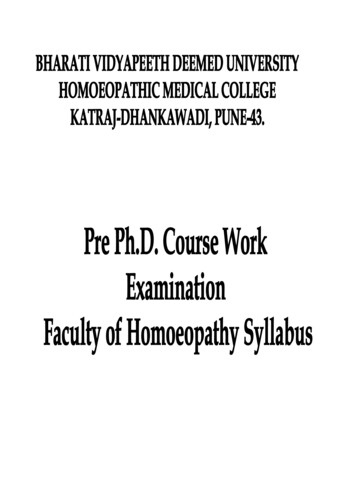
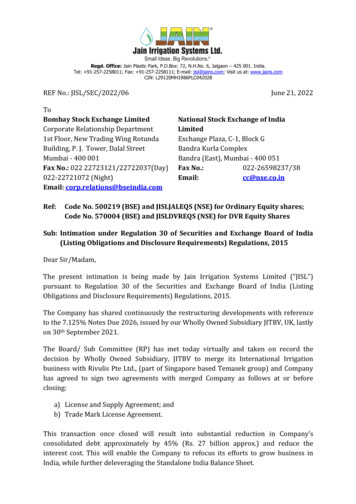
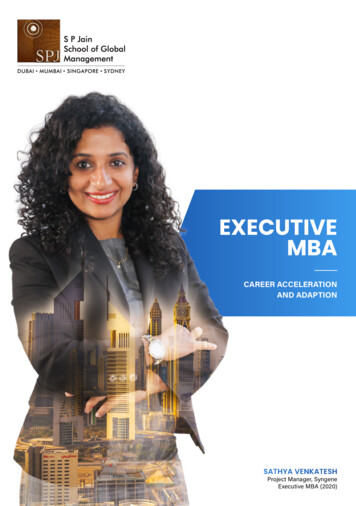
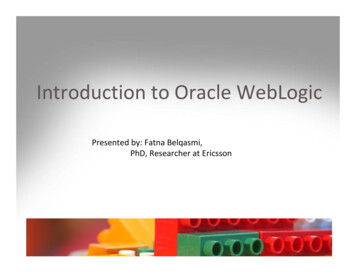
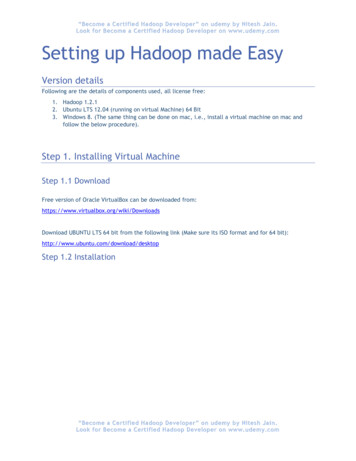
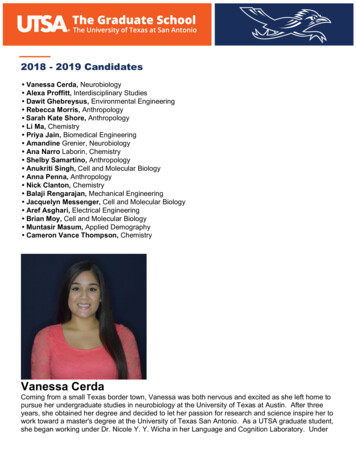
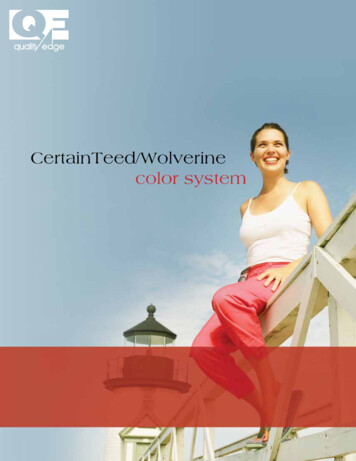
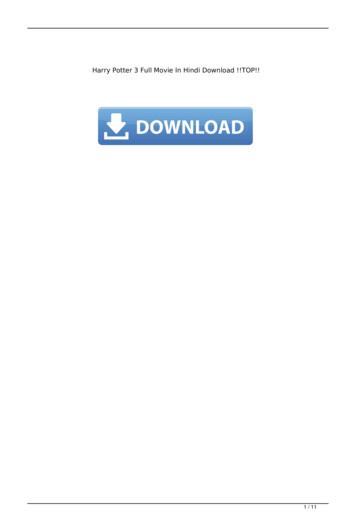
![Deadpool (2016) [BluRay] [1080p] English Free l BEST](/img/66/deadpool-2016-bluray-1080p-english-free-downloadl.jpg)
